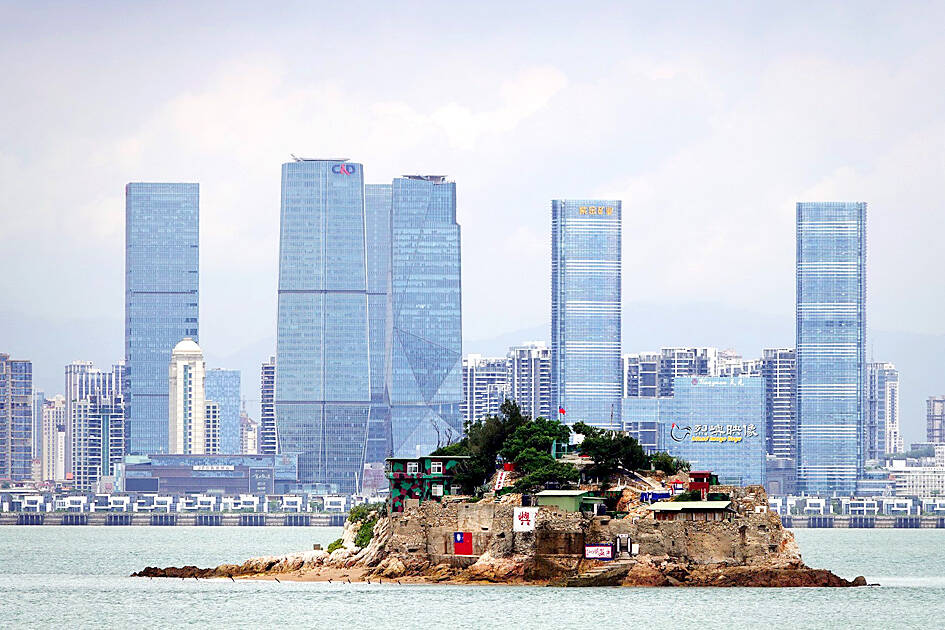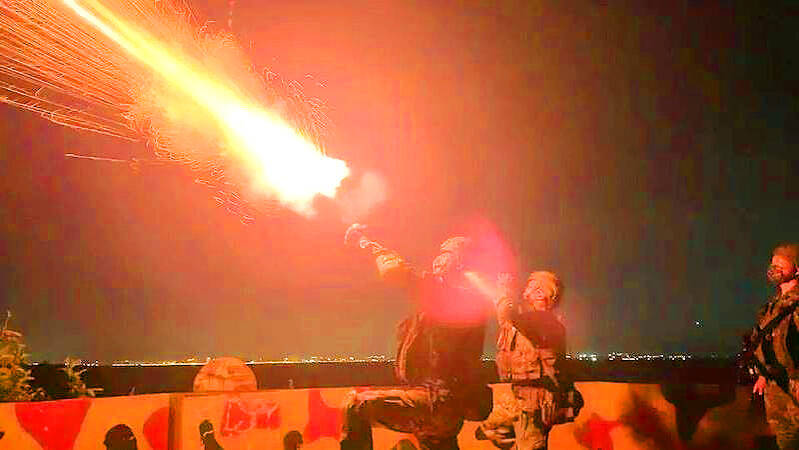Taiwan yesterday downed a civilian drone after weeks of complaints about incursions by uncrewed aerial vehicles from China, a sign Taipei is pushing back against Beijing’s efforts to encroach on its territory.
Taiwanese troops shot the drone down near Kinmen’s Shi Islet (獅嶼) at about noon after attempts to repel it failed, a statement from the garrison on the Taipei-held outpost just off China said.
That followed incidents on Tuesday and Wednesday in which Taiwanese soldiers fired warning shots and flares at civilian drones that approached the nation’s outlying islands.

Photo courtesy of retired Kinmen teacher Hung Ching-chang
The military is trying to reaffirm limits on Chinese presence near its territory after US House of Representatives Speaker Nancy Pelosi visited Taipei early last month.
President Tsai Ing-wen (蔡英文) in a speech on Tuesday urged the military to craft a strong response to China’s pressure campaign without prompting further escalation.
“Drones are part of China’s gray-zone tactics and cognitive warfare against Taiwan,” said Kuo Yu-jen (郭育仁), director of the Institute for National Policy Research in Taipei. “The incursions are an attempt to humiliate Taiwan’s military. Taiwan’s government first responded to it cautiously, and only turned tougher when they became more frequent.”

Photo courtesy of the Kinmen Defense Command
Chinese troops held unprecedented exercises for several days around Taiwan after Pelosi’s visit, including firing ballistic missiles over Taiwan proper.
Taipei has reported that an average of more than 10 Chinese warplanes have crossed the US-drafted median line that divides the Taiwan Strait each day since Pelosi’s visit, data compiled by Bloomberg News showed.
The drones’ flights over the outlying islands started in late July, although neither side has specified where they are coming from.
The Chinese Communist Party’s Global Times newspaper has said that “the frequent flights of civilian drones from the mainland [China] expose the Taiwan armed forces’ weak defenses.”
“China meant to test the response of Taiwan’s military in offshore islands like Kinmen by sending those drones, and also used these small-scale events to see how Taiwanese society responds to them,” said Crystal Tu (杜貞儀), assistant research fellow at the Institute for National Defense and Security Research. “They may also try to see whether there are loopholes in the procedure or response that they can further take advantage of.”
The Ministry of National Defense told lawmakers that China’s encroachments pose “severe military challenges,” a report seen by Bloomberg said.
Major General Lin Wen-huang (林文皇), who is in charge of combat planning at the ministry, told reporters that Taiwan would repel Chinese forces if they were to enter its territory.
“The closer the incursions are to Taiwan, the stronger our countermeasures will be,” Lin said.

NATIONAL SECURITY THREAT: An official said that Guan Guan’s comments had gone beyond the threshold of free speech, as she advocated for the destruction of the ROC China-born media influencer Guan Guan’s (關關) residency permit has been revoked for repeatedly posting pro-China content that threatens national security, the National Immigration Agency said yesterday. Guan Guan has said many controversial things in her videos posted to Douyin (抖音), including “the red flag will soon be painted all over Taiwan” and “Taiwan is an inseparable part of China,” while expressing hope for expedited “reunification.” The agency received multiple reports alleging that Guan Guan had advocated for armed reunification last year. After investigating, the agency last month issued a notice requiring her to appear and account for her actions. Guan Guan appeared as required,

A strong cold air mass is expected to arrive tonight, bringing a change in weather and a drop in temperature, the Central Weather Administration (CWA) said. The coldest time would be early on Thursday morning, with temperatures in some areas dipping as low as 8°C, it said. Daytime highs yesterday were 22°C to 24°C in northern and eastern Taiwan, and about 25°C to 28°C in the central and southern regions, it said. However, nighttime lows would dip to about 15°C to 16°C in central and northern Taiwan as well as the northeast, and 17°C to 19°C elsewhere, it said. Tropical Storm Nokaen, currently

PAPERS, PLEASE: The gang exploited the high value of the passports, selling them at inflated prices to Chinese buyers, who would treat them as ‘invisibility cloaks’ The Yilan District Court has handed four members of a syndicate prison terms ranging from one year and two months to two years and two months for their involvement in a scheme to purchase Taiwanese passports and resell them abroad at a massive markup. A Chinese human smuggling syndicate purchased Taiwanese passports through local criminal networks, exploiting the passports’ visa-free travel privileges to turn a profit of more than 20 times the original price, the court said. Such criminal organizations enable people to impersonate Taiwanese when entering and exiting Taiwan and other countries, undermining social order and the credibility of the nation’s

‘SALAMI-SLICING’: Beijing’s ‘gray zone’ tactics around the Pratas Islands have been slowly intensifying, with the PLA testing Taiwan’s responses and limits, an expert said The Ministry of National Defense yesterday condemned an intrusion by a Chinese drone into the airspace of the Pratas Islands (Dongsha Islands, 東沙群島) as a serious disruption of regional peace. The ministry said it detected the Chinese surveillance and reconnaissance drone entering the southwestern parts of Taiwan’s air defense identification zone early yesterday, and it approached the Pratas Islands at 5:41am. The ministry said it immediately notified the garrison stationed in the area to enhance aerial surveillance and alert levels, and the drone was detected in the islands’ territorial airspace at 5:44am, maintaining an altitude outside the effective range of air-defense weaponry. Following